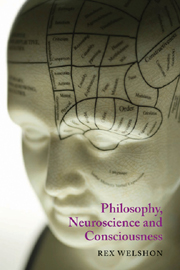Book contents
- Frontmatter
- Contents
- Preface
- Introduction
- PART I PHILOSOPHY AND CONSCIOUSNESS
- PART II NEUROSCIENCE AND CONSCIOUSNESS
- 5 Cortical evolution and modularity
- 6 Arousal, perception and affect
- 7 Attention, working memory, language and executive function
- 8 Neural models of conscious properties
- PART III PHILOSOPHY, NEUROSCIENCE AND CONSCIOUSNESS
- Concluding semi-scientific postscript
- Appendix Functional neuroanatomy
- Notes
- Bibliography
- Index
7 - Attention, working memory, language and executive function
from PART II - NEUROSCIENCE AND CONSCIOUSNESS
- Frontmatter
- Contents
- Preface
- Introduction
- PART I PHILOSOPHY AND CONSCIOUSNESS
- PART II NEUROSCIENCE AND CONSCIOUSNESS
- 5 Cortical evolution and modularity
- 6 Arousal, perception and affect
- 7 Attention, working memory, language and executive function
- 8 Neural models of conscious properties
- PART III PHILOSOPHY, NEUROSCIENCE AND CONSCIOUSNESS
- Concluding semi-scientific postscript
- Appendix Functional neuroanatomy
- Notes
- Bibliography
- Index
Summary
Cognition presents topics of long-standing interest to psychologists and neuropsychologists. Cognition encompasses a huge array of processes, including attention, working memory, and language understanding and production. Some cognitive processes are executive functions. Accounts of executive function vary enormously (Jurado & Rosselli 2007), but its component processes typically include inhibiting behaviour; learning; formulating goals; sequencing actions; integrating information; remembering; generalizing and abstracting; understanding; knowing; analysing; monitoring; introspecting; discriminating; evaluating; creating; deliberating; planning; decision-making; judging; choosing; and directing – in short, much of our daily conscious lives.
Evidence increases monthly that there are neural correlates for attention, working memory, language understanding, and for each and every one of the constitutive processes of executive function. Cataloging all the evidence is too big a job for this book. Instead, we first discuss attention, focusing on top-down forms of attention, and we introduce the paradigmatic neurological attentional disorders of acute confusional state and unilateral neglect. Second, we introduce working memory. Third, we discuss language understanding, focusing in particular on semantic understanding, and on the neurological language disorders of aphasia and alexia. Finally, we address some of the executive functions and introduce frontal lobe syndrome. Many other cognitive processes are important for determining whether conscious properties have neural substrates, but there is an enormous amount of work on memory, attention, language processes and executive function, and the points we want to make are best made by discussing them.
- Type
- Chapter
- Information
- Philosophy, Neuroscience and Consciousness , pp. 149 - 171Publisher: Acumen PublishingPrint publication year: 2010



